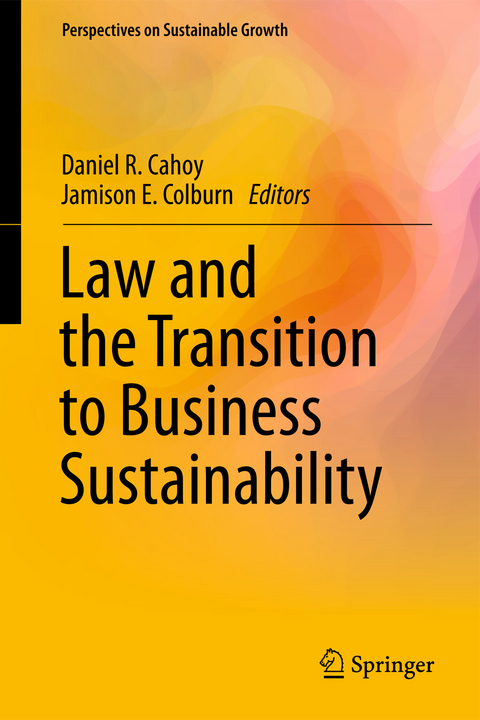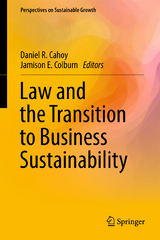Law and the Transition to Business Sustainability
Seiten
2014
|
2014
Springer International Publishing (Verlag)
978-3-319-04722-5 (ISBN)
Springer International Publishing (Verlag)
978-3-319-04722-5 (ISBN)
This book expands on law-related research by examining the legal aspects of sustainability with a focus on the impact on business strategies. It recognizes that firms must adopt an integrated approach to law and sustainability, considering multiple disciplines and goals, and serve as a forum for bringing together scholarship from fields such as environmental law, energy, government regulation and intellectual property. Firms increasingly have an interest in transitioning to sustainable business practices that take into consideration the fact that global resources are finite and will be increasingly scarce. They acknowledge that current actions have social, economic and environmental consequences and employ options to ensure that future generations have the same options and benefits. Examples of sustainable practices increasingly employed by firms include the institutionalization of "whole life-cycle" analysis in marketing and product design, utilization of sustainable inputs and energy sources, tracking and reporting sustainability performance, attempting the valuation of future generation prosperity and happiness as a discounting mechanism, and integrating sustainability into firm culture and management goals. It is clear that law and regulation have an extremely important role to play in the transition to more sustainable business practices. Broadly stated, law can provide structure for firms responding to forces that pull transition by enabling sustainability leadership and competitive advantage through funding models, intellectual property rights and collaboration means. Additionally, law can work to push transition by compelling firms to act through regulatory structures, accounting and governance mechanisms.
Design for Regulation: Integrating Sustainable Production into Mainstream Regulation.- Mandating Sustainability: When Federal Legislation May Preempt the Best Green Building Code Intentions.- An Operational Look at Take-Back Legislation.- Subsidizing Sustainability: The Role of the State and Civil Society in Implementing Wal-Mart's Local Produce Sourcing Program.- IPRs and the Transfer of Technologies that Combat Climate Change: the Untapped Potential of Licensing.- The Benefits of a Sustainable Energy Trade Agreement (SETA).- The Future of Sustainability Reporting as a Regulatory Mechanism.- Green washing 2.0: Identifying a New Paradigm Through B-to-B Threat Matrices.
| Erscheint lt. Verlag | 18.7.2014 |
|---|---|
| Reihe/Serie | Perspectives on Sustainable Growth |
| Zusatzinfo | XI, 153 p. 7 illus., 5 illus. in color. |
| Verlagsort | Cham |
| Sprache | englisch |
| Maße | 155 x 235 mm |
| Gewicht | 421 g |
| Themenwelt | Recht / Steuern ► EU / Internationales Recht |
| Recht / Steuern ► Wirtschaftsrecht | |
| Wirtschaft ► Volkswirtschaftslehre | |
| Schlagworte | Energy Policy • Environmental Law • firm behavior • Legal Environment • Regulation • sustainability • sustainable development |
| ISBN-10 | 3-319-04722-1 / 3319047221 |
| ISBN-13 | 978-3-319-04722-5 / 9783319047225 |
| Zustand | Neuware |
| Haben Sie eine Frage zum Produkt? |
Mehr entdecken
aus dem Bereich
aus dem Bereich
Vertrag über die Europäische Union, Vertrag über die Arbeitsweise der …
Buch | Softcover (2024)
dtv Verlagsgesellschaft
CHF 22,25




